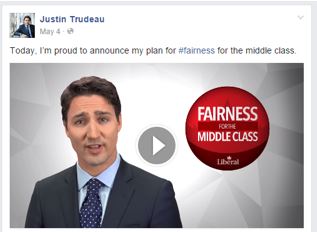
Recommended articles
On related topics
In the last quarter of 2014, we applied NATIONAL’s unique digital ethnography methodology to conversations Canadians were having on reddit.com, postulating that this popular channel, known as the front page of the internet, would serve as a window into developing trends for the broader Canadian population. Our results concluded without a doubt that for this large and engaged audience, one key value stood head and shoulders above the rest: fairness.
In some 20,000 conversations we analyzed, a staggering 82% of Canadian redditors raised the issue of fairness when discussing government, business and society in general. One year earlier, fairness was one of several values that manifested themselves in conversations. Given its sweeping breadth among redditors, we predicted that 2015 would be the year of fairness.
Fairness means being impartial when in a position of power, having a moral code and a sense of personal and social responsibility. Canadians believe businesses and leaders in positions of power or authority can and should be held to a higher standard, and they will judge their actions accordingly. For businesses, this means acting with a sense of responsibility towards their communities, including customers, business partners, stakeholders and employees. Act unfairly in employees’ work conditions (think Bangladesh) or pricing? Consumers will let you know in their purchase decisions. Grant favours – monetary or otherwise – to preferred business partners so that others don’t have a fair chance? Charge taxpayers for expenses that are dubious? The outrage will manifest itself, via social media, via wallets, via votes. No longer do people just want to buy something, they want to buy into something. They want to make sure an organization or a company’s values align with their own.
Social media have empowered citizens and consumers to speak out against unfair or even illegal practices. Indeed, in a June 21st New York Times article on the Brian Williams scandal (the NBC news anchor grossly exaggerated his part in a helicopter attack in Iraq), Ethan Zuckerman, director of the center for civic media at MIT, posits that everyone has “learned how to use outrage to make stories go viral,” and that “public trust in institutions of all kinds is at or near historic lows, a phenomenon that is well matched with the rise of social media.”
Closer to home, just think of senators’ expense accounts, journalists’ abusing their connections for personal benefit or rigged government contracts in Montreal’s construction industry – it seems obvious that we crave fairness, and that we will let our wallets and our votes do the talking. The Globe and Mail reported on June 23 on the outcome of a study by the Peter B. Gustavson School of Business at the University of Victoria on Canadians’ most trusted brands. Saul Klein, dean of the business school stated that “It’s the emotional trust that differentiates brands, and it comes from a deeper alignment between what the brand is doing and what our own interests are.” This trust rests on metrics such as “workplace practices, environmental policies and community responsibility” – the same areas we found organizations need to focus on in order to be perceived as fair.
Oh, and BTW, if you’re still unconvinced that 2015 is the year of fairness, guess what Justin Trudeau’s campaign platform is?

——— Doris Juergens is a former Partner and National Vice-President, Strategy at NATIONAL Public Relations

